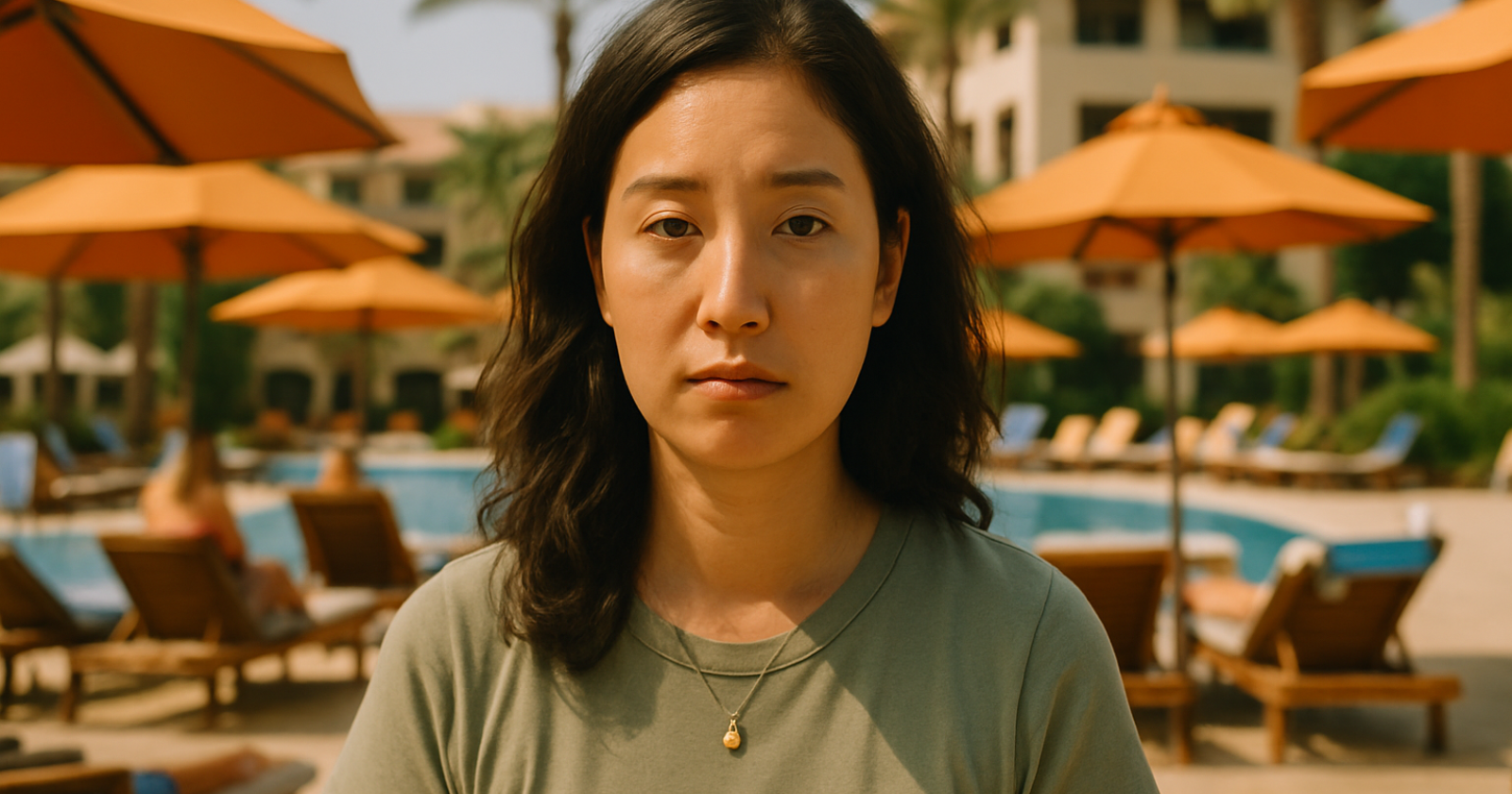I love a good out-of-office moment as much as anyone. But after years of coaching people through burnout — and comparing notes with a psychologist friend who teaches at an Ivy League university — I’ve noticed a funny pattern: some trips leave you more exhausted than your workweek ever did.
The photos look perfect. Your body, not so much.
Why?
Because a handful of sneaky vacation habits siphon energy in the background like apps you forgot to close.
If you’ve ever come home thinking, “I need a vacation from my vacation,” this one’s for you.
1. Packing your days like a spreadsheet
Tell me if this sounds familiar: you land at 10:05, drop bags at 11:00, lunch at 12:15, museum from 1:30 to 3:00, gelato at 3:05, walking tour at 4:00, sunset overlook at 7:18 (because the internet said it’s the “best angle”), dinner at 8:00 sharp.
On paper, it looks efficient. In your nervous system, it looks like a fire drill with prettier backdrops.
The psychology here is simple: when every minute is pre-sold, your brain loses two precious things — autonomy and recovery time. That tightness you feel? It’s low-grade stress from continuous time pressure and decision switching.
We think more plans = more value.
But what we’re really buying is cognitive load. A well-rested traveler chooses one anchor event per day (the hike, the museum, the long lunch) and lets the rest breathe.
Build buffers. Expect delays.
Leave a full afternoon unclaimed and see what the city offers you when you’re not chasing it. You didn’t fly across an ocean to become your own cruise director.
2. Treating sleep like a reward instead of a requirement
Vacations have a funny way of encouraging two extremes: late-night everything and early-morning everything.
Sunrises, markets, train departures, the “we’ll sleep when we get home” bravado.
The problem is that your brain doesn’t negotiate with sleep debt, it collects—with interest.
Even a couple of short nights make you more irritable, more indecisive, and more likely to reach for quick sugar or extra coffee that keeps the cycle spinning.
My psychologist friend frames it like this: vacations don’t suspend biology. Protecting sleep is the difference between experiencing a place and stumbling through it.
Try a few tiny anchors:
- Keep a stable wake time within an hour;
- If nightlife is your joy, give yourself one genuine sleep-in;
- Dim screens and lights an hour before bed; u
- Use an eye mask and earplugs even in “quiet” neighborhoods;
- Think of a 20-minute midday rest as a strategic reboot, not laziness.
Rest isn’t what you do after the fun. Rest enables the fun.
3. Leaning on the caffeine–alcohol–screen trifecta
Here’s the most common vacation energy trap: “I’m jet-lagged, so I’ll have an extra latte… and because I’m on vacation, we’ll split a bottle of wine… and since we’re tipsy we’ll scroll a bit in bed.”
That trio — stimulant, sedative, blue light — scrambles your internal clock.
Caffeine pushes sleep later than you planned, alcohol fragments the sleep you do get, and screens suppress melatonin right when your brain is trying to land the plane.
The result is what sleep researchers call social jet lag: you keep shifting your bedtime around your plans, and your body never catches up.
A gentler approach still feels delicious: front-load caffeine to the morning (cut it 8–10 hours before sleep), swap late-night alcohol for an earlier glass with dinner or a spritz with soda water, and give yourself a “last screen” time.
Want to feel shockingly better? Step into bright morning light for 10–15 minutes the first two days.
Your circadian system reads that as a reset and, suddenly, your late dinner doesn’t turn into a 3 a.m. ceiling-staring session.
4. Riding the decision treadmill (and keeping a budget meter running in your head)
Vacation promises freedom and then hands you… menus longer than novellas, 1,000 “Top 10” lists, and a quiet math problem buzzing in the background: “We’ve spent X today, so can we splurge on Y?”
That constant micro-calculating drains you, even if you’re excellent with numbers.
Psychologists call it decision fatigue: the more choices you make, the worse the choices become, and the less joy you feel from any of them.
Two fixes help immediately.
- Pre-decide the boring stuff: pick a go-to breakfast, default lunch (salad + bread, noodles + veggies—whatever), and a daily transport method so you’re not negotiating every hour.
- Separate money from moments: set a “daily fun” envelope (digital or actual) before you leave the hotel.
When it’s spent, you’re done thinking about it. You’ll be shocked how much lighter you feel when you’re not comparing every pastry to tomorrow’s boat ticket.
Fewer micro-decisions, more macro-memories.
5. Performing the trip instead of living it
I say this with love: if your first thought when you arrive is “Where would this look best on my feed?” you’ve already handed your vacation to an audience.
Performed experiences burn energy in two places — anticipation (“Do we have enough content?”) and post-production (“We should edit this, caption that, answer those DMs”).
It’s not that sharing is wrong — it’s that performing changes the purpose.
You become the camera operator rather than the traveler. A very simple ritual restored my joy on the road: the one-take rule.
Snap one photo or video per scene, no reshoots. Then pocket the phone and take five sensory notes — what you smell, the texture of the air, the sound under the sound.
If you love posting, batch it later during a lazy hour and treat it like a scrapbook, not a scoreboard.
Presence is an energy multiplier. When you stop auditioning your life for invisible judges, the trip feeds you instead of feeding on you.
6. Letting other people’s preferences run your entire itinerary
There’s a special place in Vacation Limbo for the person who plans everything around everyone else — and feels strangely empty by day three.
People-pleasing on trips is uniquely exhausting because you’ve removed your usual recovery pockets (home, gym, your own kitchen), so the only “charging station” left is honoring what you need.
But group trips and couple trips are real.
How do you protect energy without becoming the villain?
Try the Yours/Mine/Ours method before you go.
Each person names one non-negotiable (Mine), the group plans one shared highlight (Ours), and the rest is flexible time (Yours), where no one has to justify wanting a solo gallery hour or a hammock afternoon.
Then write the plan down so it’s not re-negotiated 17 times on the sidewalk in 90-degree heat.
Bonus boundary: build “float windows” where anyone can opt out with no social penalty. Love deep togetherness? Great—opt in! But let’s stop equating constant proximity with closeness.
A little space can save the trip and your sanity.
7. Forgetting to plan for re-entry (a.k.a. the Monday face-plant)
We romanticize departures — countdowns, playlists, airport outfits — and neglect the part where your suitcase explodes onto your bedroom floor and Monday morning shows up like a tax bill.
Re-entry whiplash is real: the brain resists abrupt context shifts, especially from novelty back to routine.
The result is two wasted days of “What am I doing?” and a creeping sense that vacations always cost you twice — once in money and again in recovery.
The fix is surprisingly unglamorous and wildly effective. Schedule a soft landing: one buffer night at home if you can swing it, or at least a late return that gives you 12 waking hours to reset.
On the plane (or train), write a tiny re-entry list with five things: unpack, laundry in, groceries or delivery plan, tomorrow’s top three tasks, and one nice thing (a bath, a walk, a favorite show).
Future-you will bless past-you for not leaving a scavenger hunt of chaos.
Vacations end. Your life doesn’t. Treat the handoff with care.
Final thoughts
Vacations are supposed to refill you. But they can’t if you’re sprinting through them like an unpaid intern with prettier scenery.
The common thread in all seven energy leaks is this: chronic over-management.
Over-managing time. Over-managing sleep. Over-managing impressions, choices, other people’s happiness, even your own return home.
The psychology is less mysterious than we make it: bodies like rhythm, brains like autonomy, and nervous systems calm down when pressure drops.
You don’t need a 27-point protocol. You need a gentler stance.
One anchor plan per day. One honest bedtime. One screen-light boundary. One ritual that’s just for you, even on a group trip. And one soft landing when you return.
If you build your next getaway around those, you’ll bring home more than photos. You’ll bring back a self that feels rested, present, and ready to step into the life you actually took a vacation to enjoy.
What’s Your Plant-Powered Archetype?
Ever wonder what your everyday habits say about your deeper purpose—and how they ripple out to impact the planet?
This 90-second quiz reveals the plant-powered role you’re here to play, and the tiny shift that makes it even more powerful.
12 fun questions. Instant results. Surprisingly accurate.


Leave a Reply
You must be logged in to post a comment.